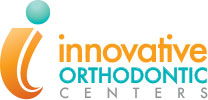An excessive overbite, also called a deep bite, is one of the most common orthodontic problems we see at Innovative Orthodontic Centers. This type of malocclusion (bad bite) can affect children, teenagers and adults.
In this post, we’ll take a deep dive into excessive overbites and cover:
- What is an overbite (deep bite)?
- Overjet vs. overbite
- What causes a deep bite?
- Why does an excessive overbite need to be corrected?
- How to fix an overbite
What is an Overbite (Deep Bite)?
Overbite refers to the degree that the top front teeth overlap the bottom front teeth when your back teeth are closed. Having an overbite is normal and necessary. In fact, a lack of overbite (i.e., top and bottom teeth don’t overlap) is called an open bite and is its own type of malocclusion.
However, when the vertical overlap is too large, meaning the top teeth bite down too far over the bottom teeth, it’s problematic and should be treated by an orthodontist like Dr. Manal Ibrahim or Dr. Christine Gin. In extreme cases, a deep bite can cause your bottom teeth to bite into the sensitive tissues behind the upper front teeth.
An excessive overbite can be:
- Dental – related to the size or position of the teeth
- Skeletal – related to the size or position of the jaw
- A combination of both
What does an overbite look like? If you have an excessive overbite, or deep bite, the top front teeth will cover the majority of your bottom front teeth when your mouth is closed. While a mild overbite isn’t usually a huge aesthetic concern and tends to be detected after a patient visits us for a more obvious issue like protruding front teeth, a severe overbite can affect the face. It can create the appearance of a receding or “weak” chin and interfere with the way the lips fit together, giving the mouth a misshapen look.
Overjet vs. Overbite
People often use the terms overbite and overjet interchangeably, and while many people with an excessive overbite will also have overjet teeth, they are two different issues. Overjet is when the top front teeth extend beyond or flare out over the bottom teeth. People sometimes call them “buck teeth.”
When comparing overjet vs. overbite, overjet refers to the horizontal distance between the front top and bottom teeth, while overbite is a vertical measurement.
What Causes an Overbite?
- Genetics – A deep bite is often genetic and due to the upper and lower jaw growing at different rates. Most commonly, an overbite is the result of a small lower jaw, which is an inherited trait. Since the lower jaw is shorter, the upper teeth are further forward and cover an excessive amount of the lower teeth. The bottom front teeth may get squeezed as they grow under the upper teeth, causing crowding too.
- Overly Strong Chewing Muscles – When the chewing muscles are very strong, which can happen in people who clench or grind their teeth (bruxism), the bite may deepen.
- A Missing Bottom Teeth – When a bottom tooth is missing in the back of the mouth and isn’t replaced, it can create a situation similar to having a too-small lower jaw and lead to a deep bite.
- Aging – Your smile changes as you age, and one such change is a deepening of the bite, particularly if you experience lower tooth loss, periodontal disease, lower jaw shrinkage, worn teeth or you grind your teeth. You might develop a deep bite over time or, if you already had one, it will continue to get worse as you get older. And, if you had braces or Invisalign in the past and stopped wearing your retainer, this can cause a relapse of a deep bite later in life as well.
- Oral Habits – Studies have tied atypical swallowing patterns to the development of a deep bite. Habits, such as thumb and finger sucking, prolonged pacifier use and mouth breathing, can also worsen an excessive overbite.
Why Does a Deep Bite Need to be Corrected?
If you have a deep bite, it’s important to visit an orthodontic specialist to have it evaluated. An untreated deep bite can cause a number of complications including:
- Increased Likelihood of Tooth Decay and Gum Disease – A deep bite is often accompanied by crowding, which makes effectively brushing and flossing more difficult, increasing your risk of tooth decay and gum disease. In cases of a severe overbite, the lower teeth may touch the gums behind the top teeth, causing gum recession, sores and damage.
- Excessive Wear of Tooth Enamel – Because of the way the top and bottom teeth come together when you bite or chew, certain teeth will wear down more quickly. The lower front teeth may also lose structure as they hit the back of the upper front teeth. This impacts the appearance of your smile. And, as enamel wears down, the teeth no longer have their protective coating, so they’ll be more susceptible to tooth decay.
- Difficulty Chewing – A moderate to severe deep bite can interfere with your ability to bite and chew, making it hard and/or painful to eat certain foods.
- Airway Issues – The airway can be restricted when the lower jaw is too small or set too far back, which is the issue behind many cases of a severe overbite. Airway restriction can then cause snoring and sleep apnea. A study found that the majority of kids with obstructive sleep apnea who didn’t engage in mouth breathing had a deep bite.
- Speech Problems – Any type of malocclusion, including a deep bite, can affect speech. This is because producing certain sounds relies on tongue contact or positioning and air flow in the mouth. The alignment of the teeth and jaw can influence these factors and cause speech to sound slurred or make it hard to clearly produce specific speech sounds.
- Jaw and TMJ Pain – An excessive overbite puts undue pressure on the jaw, temporomandibular joint (TMJ), teeth and chewing muscles, which can lead to TMJ pain and dysfunction and the related headaches, neck aches, facial pain and ear aches.
- Loss of Self-Confidence – Having a significant overbite can make you feel self-conscious. While there are plenty of oral health and functional benefits of getting braces or Invisalign for an overbite, the boost in confidence that comes with loving your smile is important too!
How to Fix an Overbite
When determining how to fix an overbite, your Shorewood or Naperville orthodontist will use your diagnostic records and the findings from an oral exam to develop an accurate diagnosis. They’ll then create a personalized treatment plan that will account for the type of overbite, any co-occurring issues, your age and lifestyle. Treatment options could include:
Phase 1 Orthodontic Treatment
While we can correct an excessive overbite at any age, a moderate to severe skeletal overbite, or deep bite, will benefit from early orthodontic treatment, also called phase 1 orthodontic treatment. Intervening early can make later treatment faster, easier and more affordable. It may also help kids avoid the need for jaw surgery or extractions.
One example where phase 1 treatment would be needed for a deep bite is if the development of your child’s jaw causes a narrow airway and results in obstructive sleep apnea or snoring.
During phase 1 orthodontic treatment, Dr. Ibrahim or Dr. Gin would use an orthodontic appliance to guide jaw growth and fix the excessive overbite. After a resting period, phase 2 orthodontic treatment would start where we would straighten your child’s teeth with braces or Invisalign Teen.
Braces for Overbite Correction
Using braces for overbite correction can lead to excellent results. Some patients might respond to braces alone. However, since braces straighten the teeth in each arch independently of one another, connective force could be needed to simultaneously improve the bite.
To do this, we may pair our self-ligating braces and custom SureSmile® wires with an auxiliary like rubber bands or the >BioBiteCorrector® (BBC). While the braces straighten our teeth, the rubber bands or BBC will help shift the upper teeth back and the lower teeth forward to open the bite.
Invisalign and Invisalign Teen for Overbite Correction
Can Invisalign fix an overbite? Absolutely! At Innovative Orthodontic Centers, we’re not just a leading Shorewood and Naperville Invisalign provider, we’re also a Diamond+ Top 1% provider, meaning we’re among the top providers in the world. With over 4,000 smiles transformed with Invisalign at our practice, we have the case experience and expertise to treat even complex problems with clear aligners. In fact, everyone is a candidate for Invisalign at Innovative Orthodontic Centers.
For some patients, we can use Invisalign for an overbite on its own and get great results. Other patients may require Invisalign attachments and rubber bands, which will help to shift the bite into the ideal place while the aligners straighten the teeth.
Invisalign With Mandibular Advancement (MA)
For patients who are still growing, Dr. Ibrahim and Dr. Gin offer Invisalign with MA, which is a hardware-free way to treat an excessive overbite. The aligners are made from the same, smooth, clear, BPA-free plastic as Invisalign, Invisalign Teen and Invisalign First aligners.
However, as the first FDA-approved clear aligner treatment for Class II malocclusion, or an excessive overbite, the aligners also have precision wings that sit between the premolars and first molars. When a child or teen bites down, the wings engage the lower jaw (mandible) in a forward position.
The lower jaw advances incrementally into its ideal place and grows to the proper size. Once it’s matched with the upper jaw, the excessive overbite disappears. While this orthopedic correction is happening, the aligners also align and level the teeth.
Overbite Correction for Adults
In the past, overbite surgery (i.e., corrective jaw surgery to realign the jaw) along with orthodontic treatment was used for adult patients with a severe deep bite. Thankfully, due to our high-tech approach and extensive experience with complex, multidisciplinary cases, we have alternatives to overbite surgery at Innovative Orthodontic Centers. Patients from all over the world visit us for our cutting-edge, non-surgical treatment.
Looking for the Best Orthodontist in Naperville or Shorewood to Fix Your Overbite?
Look no further! Innovative Orthodontic Centers has been named the best orthodontist in Naperville, IL by Naperville Magazine for 14 years running. Our board-certified orthodontists deliver world-class care using state-of-the-art treatment to help you get a stunning smile more comfortably and conveniently. Take a look at our overbite before and after photos to see our results for yourself. And, to get personalized treatment recommendations, schedule a complimentary consultation with us today!





